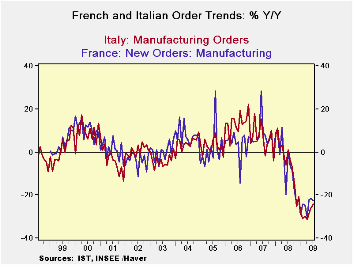 Global| Sep 21 2009
Global| Sep 21 2009Industrial Orders Keep Rising In France And In Italy Pessimism Continues To Haunt The Outlook, However
Summary
French orders were up by a solid 2% in July as foreign orders surged by 14%. In Italy orders jumped by 3.2% on foreign order strength of 15.6%. Both Italy and France as seeing strong orders in the new quarter (Q3, one month in) led by [...]

French orders were up by a solid 2% in July as foreign orders
surged by 14%. In Italy orders jumped by 3.2% on foreign order strength
of 15.6%. Both Italy and France as seeing strong orders in the new
quarter (Q3, one month in) led by huge gains in orders from abroad.
Both Italy and France show recovery patterns of order growth
but order levels that remain just a bit less than 25% below year-ago
levels.
Europe- Europe continues to show economic recovery. But with
the G-20 set to meet in the re-made but old US industrial city of
Pittsburgh, the OECD, the IMF and a German think-tank have taken this
opportunity to highlight the risks to the future of this recovery. The
OECD is very concerned about the health of banks and that there could
be some backsliding and troubles with capitalization. The IMF is
concerned that German employment could rise sharply over the next year,
pushing unemployment to over 10.5% and creating weak growth under 0.5%
in 2010. This would clearly become a problem for growth in the rest of
the e-Zone. Not to be outdone by this sort of sour outlook, the German
think-tank IWH Institute warns of a credit crunch highlighting the
potential for a double dip as government stimulus programs come off the
books.
Pessimism shuns trends: Despite some very strong current
indicators that spread across the major EMU economies there remains in
Europe, much like in the US, a core of pessimism about the risks.
Unlike after other recessions apparently this recovery cannot be
trusted to bottom and begin to rise and for that upswing to be
self-sustaining. The abnormal degree of and scope of early government
help that will eventually be rescinded is one of the common culprits in
both US and European pessimism. If that is so what ever do it in the
first place?
Professional pessimists: While we expect the main
international regulators and oversight agencies to be less than
cheerleaders and to be wary of risks, the extent to which private
sector naysayers have piggy-backed on that tact is surprising. For now
we are left with the reality of an upswing and one that is looking
quite nice and consistent across EMU nations. Meanwhile, the outlook
sours as we speak. While the future may still hold risks, one must
wonder if they are as great as is being said or if lowering
expectations has been taken to a new extreme by politicians who in the
end are chastened by their own role in this crisis by seeing it develop
and watching powerlessly, aware that it is a disaster that occurred on
their watch.
| Italy Orders | ||||||
|---|---|---|---|---|---|---|
| Saar exept m/m | Jul-09 | Jun-09 | May-09 | 3-mo6-mo12-mo | ||
| Total | 3.2% | 2.6% | 0.8% | 29.5% | -1.9% | -24.2% |
| Foreign | 15.6% | 2.6% | 0.9% | 105.4% | 17.6% | -19.1% |
| Domestic | -2.9% | 2.5% | 0.7% | 0.9% | -11.3% | -26.9% |
| Memo | ||||||
| Sales | 0.7% | -1.6% | -1.0% | -7.4% | -11.0% | -22.1% |
| French Orders | ||||||
| Saar exept m/m | Jul-09 | Jun-09 | May-09 | 3-mo6-mo12-mo | ||
| Total | 2.0% | 1.2% | 0.0% | 13.7% | 5.6% | -22.6% |
| Foreign | 14.0% | -3.0% | 7.0% | 96.1% | 19.1% | -16.7% |
| IP xConstruct | 0.6% | 0.2% | 3.0% | 16.3% | 2.8% | -13.8% |
Robert Brusca
AuthorMore in Author Profile »Robert A. Brusca is Chief Economist of Fact and Opinion Economics, a consulting firm he founded in Manhattan. He has been an economist on Wall Street for over 25 years. He has visited central banking and large institutional clients in over 30 countries in his career as an economist. Mr. Brusca was a Divisional Research Chief at the Federal Reserve Bank of NY (Chief of the International Financial markets Division), a Fed Watcher at Irving Trust and Chief Economist at Nikko Securities International. He is widely quoted and appears in various media. Mr. Brusca holds an MA and Ph.D. in economics from Michigan State University and a BA in Economics from the University of Michigan. His research pursues his strong interests in non aligned policy economics as well as international economics. FAO Economics’ research targets investors to assist them in making better investment decisions in stocks, bonds and in a variety of international assets. The company does not manage money and has no conflicts in giving economic advice.
More Economy in Brief
 Global| Feb 05 2026
Global| Feb 05 2026Charts of the Week: Balanced Policy, Resilient Data and AI Narratives
by:Andrew Cates






